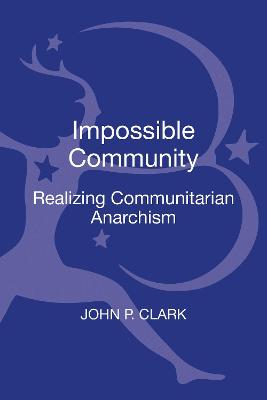Contemporary Anarchist Studies
1 total work
This book is available as open access through the Bloomsbury Open Access programme and is available on www.bloomsburycollections.com.
The Impossible Community confronts a critical moment when social and ecological catastrophe loom, the Left seems unable to articulate a response, and the Right is monopolizing public debates. This book offers a reformulation of anarchist social and political theory to develop a communitarian anarchist solution.
It argues that a free and just social order requires a radical transformation of the modes of domination exercised through social ideology and institutional structures. Communitarian anarchism unites a universalist concern for social and ecological justice while recognizing the integrity and individuality of the person. In fact, anarchist principles of mutual aid and voluntary cooperation can already be seen in various contexts, from the rebuilding of New Orleans after Katrina to social movements in India.
This work offers both a theoretical framework and concrete case studies to show how contemporary anarchist practice continues a long tradition of successfully synthetizing personal and communal liberation. This significant contribution will appeal not only to students in anarchism and political theory, but also to activists and anyone interested in making the world a better place.
The Impossible Community confronts a critical moment when social and ecological catastrophe loom, the Left seems unable to articulate a response, and the Right is monopolizing public debates. This book offers a reformulation of anarchist social and political theory to develop a communitarian anarchist solution.
It argues that a free and just social order requires a radical transformation of the modes of domination exercised through social ideology and institutional structures. Communitarian anarchism unites a universalist concern for social and ecological justice while recognizing the integrity and individuality of the person. In fact, anarchist principles of mutual aid and voluntary cooperation can already be seen in various contexts, from the rebuilding of New Orleans after Katrina to social movements in India.
This work offers both a theoretical framework and concrete case studies to show how contemporary anarchist practice continues a long tradition of successfully synthetizing personal and communal liberation. This significant contribution will appeal not only to students in anarchism and political theory, but also to activists and anyone interested in making the world a better place.
